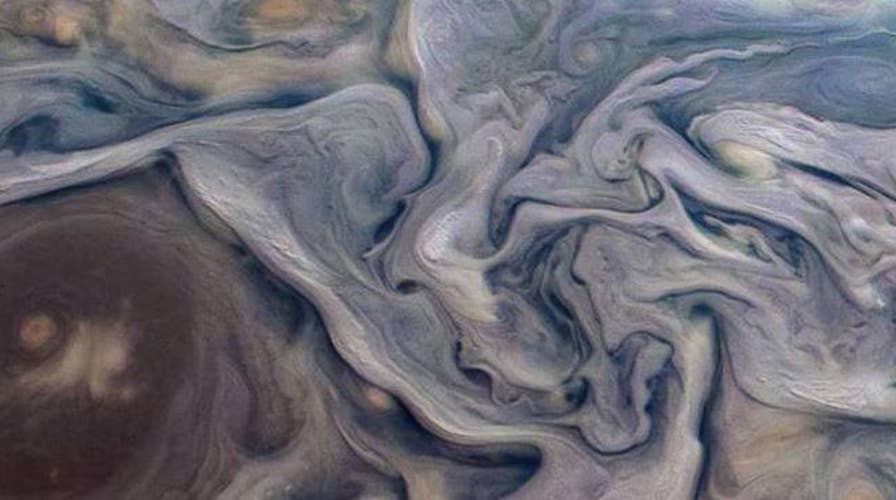Jupiter's 'dramatic' features from NASA's Juno mission wow the internet
Jupiter's 'dramatic' features from NASA's Juno mission wow the internet and space enthusiasts.
NASA revealed its impressive view from its Juno space probe over the weekend, and to say space enthusiasts were impressed would be an understatement.
"Dramatic atmospheric features in #Jupiter's northern hemisphere are captured in this image from my latest flyby," NASA wrote in a Feb. 22 tweet, sharing a photo of Jupiter's swirling clouds. The image was taken on the morning of Feb. 12 during the spacecraft's 18th flyby of the gas giant.
The photograph stunned space enthusiasts, who once again commented on the planet's mesmerizing colors. Dozens compared Jupiter's northern hemisphere to a work of art.
'CREATURES' IN JUPITER'S CLOUDS? NASA'S JUNO SPACECRAFT CAPTURES IMAGES THAT STUN THE INTERNET
"It's a Monet!" one Twitter user exclaimed.
"Van Gogh, is that u?" another asked, referring to the famous Dutch painter.
"This part reminds me of a child in the womb, and all that swirls around him or her in the waking world," a third observed.
Juno was roughly 8,000 miles away from the tops of Jupiter's clouds when the image was snapped, NASA revealed in a statement.
"The new perspective shows swirling clouds that surround a circular feature within a jet stream region called 'Jet N6,'" the space agency added.
A "dragon's eye," "squid," and "dolphins" are among the "creatures" social media users have spotted within Jupiter's vicinity during Juno's mission. NASA's Jet Propulsion Laboratory frequently releases batches of new images as the spacecraft circles the gas giant.
IMAGES OF JUPITER BY NASA'S JUNO SPACECRAFT
Juno marked the "halfway point" of its mission on Dec. 21.
"Juno is in a highly-elliptical 53-day orbit around Jupiter," NASA explained in a Dec. 12 news release. "Each orbit includes a close passage over the planet's cloud deck, where it flies a ground track that extends from Jupiter's north pole to its south pole."
NASA's Juno spacecraft was launched on Aug. 5, 2011, and arrived at Jupiter five years later — in July 2016. Juno's mission is slated to come to a close in July 2021 after the spacecraft slowly orbits Jupiter, collecting important data along the way.
"Juno's principal goal is to understand the origin and evolution of Jupiter. Underneath its dense cloud cover, Jupiter safeguards secrets to the fundamental processes and conditions that governed our solar system during its formation. As our primary example of a giant planet, Jupiter can also provide critical knowledge for understanding the planetary systems being discovered around other stars," NASA describes on its website.
As the spacecraft continues to explore the fifth planet from the Sun, space lovers should expect to see even more astonishing pictures.
